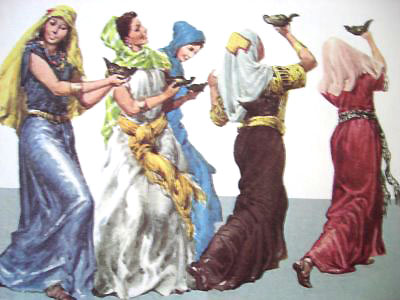 “Then the kingdom of heaven shall be likened to ten bridesmaids who took their lamps and went out to meet the bridegroom.
“Then the kingdom of heaven shall be likened to ten bridesmaids who took their lamps and went out to meet the bridegroom.
“Now five of them were wise, and five were foolish.
“Those who were foolish took their lamps and took no oil with them, but the wise took oil in their vessels with their lamps. But while the bridegroom was delayed, they all slumbered and slept.
“And at midnight a cry was heard: ‘Behold, the bridegroom is coming; go out to meet him!’ Then all those bridesmaids arose and trimmed their lamps.
“And the foolish said to the wise, ‘Give us some of your oil, for our lamps are going out.’
“But the wise answered, saying, ‘No, lest there should not be enough for us and you; but go rather to those who sell, and buy for yourselves.’
“And while they went to buy, the bridegroom came, and those who were ready went in with him to the wedding; and the door was shut.”
— Matthew 25:1-11 (New King James Version)
The things we remember from your childhood! I was taught this parable in Sunday School when I was still of single-digit age and somehow how it stuck in my memory. I took from it multiple lessons:
– Always be prepared, especially for the unexpected, especially for things to be delayed or to go wrong.
– It’s good to share, but not if it creates more harm than good, not if it leaves everyone worse off.
– Carelessness has consequences.
I remember shooting my hand up and asking some version of, “But I thought we were supposed to share?” Time shapes all memories, but as best I recall, I received some version of, “Not if it leaves everyone worse off, not if you do not have enough as a result.”
At some point, if those who do not plan and prepare, those do not discipline themselves, those who do not lay aside for tomorrow are continually bailed out, where is the incentive to be wise? Why not just live recklessly and give “no thought for tomorrow”?


0 Comments